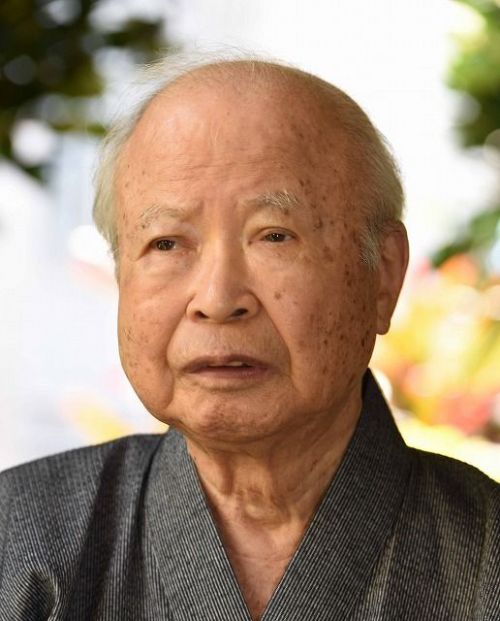Tatsuhiro Oshiro, first Okinawan to win Akutagawa Prize for work on postwar Okinawa, dies at 95

Tatsuhiro Oshiro reflecting on his career in the arts during an interview with Ryukyu Shimpo for the 70th anniversary of WWII at his home in Shuritera-Cho, Naha City, July 22, 2015.
October 28, 2020 Ryukyu Shimpo
Tatsuhiro Oshiro, Okinawa’s first Akutagawa Prize-winning author and leader in Okinawan literature, died of old age at 11:10 a.m. on October 27 at a hospital in Kitanakagusuku Village. He was 95 years old. The Nakagusuku-native examined Okinawan identity throughout his career. Oshiro fell ill in March and had been in and out of the hospital while he continued to write about the general history of Okinawa and Ryukyu from his unique perspective in various media, including novels, plays, critiques and essays, in which he embodied Okinawa’s postwar history.
His autobiographical novel, Yakeato no Kōkōkyōshi (A High School Teacher in the Ashes), published in May by Shueisha Inc., was based on his experience as a high school teacher in U.S.-occupied Okinawa. It is his last published work.
Oshiro was born in 1925. After graduating from the Prefectural Daini Middle School, he enrolled in the Tung Wen College in Shanghai, China. The school was closed after the war, and Oshiro returned to Okinawa without completing his studies.
In post-war Okinawa, Oshiro worked as a Ryukyu government employee under the U.S. Administration. Later, when the prefecture was returned to Japan, he continued to work as a prefectural government worker. Linking the frustrations of his youth with the fate of Okinawa, Oshiro became ideologically motivated to wet his feet in literature and began writing while working as a government worker. In 1967, before Okinawa reverted to Japan, he won the Akutagawa Prize for The Cocktail Party, in which he exposes the deceitfulness of the U.S.-Ryukyu relationship through the story of an assault committed by a U.S. soldier. Oshiro also wrote about the Okinawa Problem and published The Ryukyu Disposition: A Novel in 1968. Post-reversion, Oshiro served as director of the Okinawa Prefectural Museum.
Oshiro received the Kinokuniya Theatre Awards (Kinokuniya Engeki Shō) for his play, The Times, They are A-changin’. In 1993, he received the Hirabayashi Taeko Prize for his novel, Hi no Hate kara (From the Edge of the Sun), which tells the story of a prison in wartime Okinawa. He was awarded the Medal of Honor, Purple Ribbon (Shiju Hōjō) by the Japanese Government for his literary excellence in 1990; the Order of the Rising Sun Fourth Class, a national decoration for distinguished achievements, in 1996; the Ryukyu Shimpo Award in 1998; and the Prefectural Achievement Award in 2000. In 2015, he received the Kawabata Yasunari Literary Award for Rēru no Mukō (The Other Side of the Rail) and in 2019, the Inoue Yasushi Memorial Cultural Award.
Throughout his career, Oshiro actively spoke on Okinawa’s military base issues. In 2005, he gave an interview to this newspaper to discuss the construction of the new base in Henoko, Nago City, to accommodate the relocation of the U.S. Marine Corps Futenma Airbase. Oshiro called it “the second Ryukyu disposition,” and concluded that “the [new] challenge for the Okinawan people is to stop the base from being built in Henoko.”
In 2011, he published a collection of short stories centered on the military base issue, titled To Futenma (Futenma yo). Ōshiro was also influential in preserving and developing Okinawa’s traditional performing arts and even wrote new Kumi Odori (a type of musical composed of words, old Okinawan music and dance) numbers.
The memorial service for Oshiro will be held from 2:00 to 2:45 p.m. on October 30, at the Inanse Funeral Home, located at 1-7-1 Inanse, Urasoe City. His eldest son Tatsuya is the chief mourner.
(English translation by T&CT and Monica Shingaki)
Previous Article:Protest at Futenma Air Station gate marks 8 years of bid for peace by Gospel-singing association
Next Article:Editorial: Prime Minister Suga’s first policy speech reveals incongruity between words and actions that needs rectification
[Similar Articles]
- Okinawan-Canadian receives honorary degree after 70 years
- Azama named National Language Teacher of the Year
- Former US soldiers of Okinawan descent; war destroys all
- AmerAsian School in Okinawa receives the Japan Foundation Prizes for Global Citizenship
- Okinawa Argentine doctor awarded for his contribution to local community
 Webcam(Kokusai Street)
Webcam(Kokusai Street)


